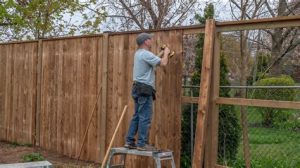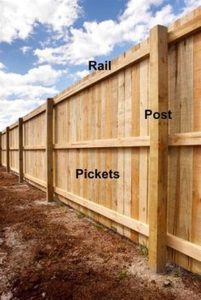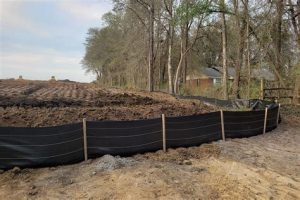Learn how to navigate local building codes, fence regulations, and materials while ensuring your plans gain approval from authorities for a successful fence project.When it comes to building a fence, homeowners often face the challenge of ensuring compliance with local building codes. Adhering to these regulations is crucial not only for legal reasons but also for maintaining community standards and avoiding potential fines. Navigating the complexities of local ordinances can seem daunting, but it’s a necessary step in the construction process. In this blog post, we will walk you through essential steps to ensure your fence aligns with local codes—beginning with understanding the regulations specific to your area and including tips on working with professionals. Whether you’re looking to enhance privacy, security, or aesthetics, having all the right information at your fingertips will help you create a beautiful and compliant fence that meets both your needs and local requirements. Let’s delve into the details!
Understanding local building codes
When planning to install a fence on your property, it is crucial to understand local building codes. These codes are established to ensure safety, aesthetics, and to maintain property values within communities. Each municipality may have its own unique set of regulations that dictate various aspects of fence installation, including height, materials, and placement.
Local building codes can vary significantly from one area to another, which is why it’s essential to research the specific requirements in your locality. For instance, some regions may allow a maximum fence height of 6 feet, while others may impose restrictions of only 4 feet for front yard installations. Furthermore, certain materials might be deemed unacceptable due to fire safety regulations or environmental concerns.
To avoid potential fines or having to dismantle your newly installed fence, it’s wise to check in with your local building department. They can provide you with documentation or guidelines outlining the specific code requirements that apply to your area.
Researching fence regulations in your area
When it comes to installing a fence, understanding the relevant regulations in your area is crucial. Local codes and zoning laws dictate various aspects of fence construction, from height and design to material restrictions. Failing to comply with these regulations can lead to fines, mandatory removal of your fence, or other complications.
The first step in your research is to contact your local government or municipal office. Many cities and counties maintain an online database or a planning department that can provide you with specific information regarding fence regulations in your locality.
Additionally, consider consulting online resources or local community boards. These platforms often contain insights from fellow homeowners who have gone through similar processes. Remember to take notes on requirements like setback distances, height limits, and any necessary permits you may need to obtain.
| Regulation Type | Description |
|---|---|
| Height Limit | The maximum allowable height of your fence. |
| Setback Requirements | The distance your fence must be set back from property lines. |
| Materials Restrictions | Any prohibited materials for fencing. |
| Permit Requirements | Whether you need to apply for a permit before starting construction. |
Consulting with a professional surveyor
When it comes to ensuring that your fence is compliant with local building codes, consulting with a professional surveyor is a critical step. A surveyor brings specialized knowledge and expertise that can help remove the guesswork in your fencing project. They can help you determine the exact property lines of your land, thereby minimizing the risk of encroaching on a neighbor’s property.
In addition, a professional surveyor can provide valuable insights regarding any easements or restrictions that might exist on your property. These could include utility easements, which, if ignored, could lead to complications in the future. Engaging with a surveyor allows you to navigate through the complexities of local regulations and ensures that your fence meets the legal requirements.
Moreover, many surveyors are familiar with the local building codes and regulations associated with fencing. They can advise you on necessary permits and procedures, ensuring your project stays compliant from the outset. By incorporating their expertise into your planning process, you can construct a fence that not only enhances your property but also adheres to legal guidelines.
Selecting appropriate materials for your fence
When it comes to selecting appropriate materials for your fence, several factors must be considered to ensure the fence is both durable and compliant with local regulations. The choice of materials will affect the aesthetic appeal, maintenance requirements, and overall cost of your fencing project.
- Wood: Offers a natural look and can be customized with various stains and finishes. However, it may require regular maintenance to prevent rot and insect damage.
- Vinyl: Resistant to fading, cracking, and insects. It is easy to clean and does not require painting, making it a popular low-maintenance choice.
- Metal: Includes options like wrought iron or aluminum, providing a sturdy and secure option. While durable, metal fences might need periodic upkeep to prevent rust.
- Chain Link: Often the most economical choice, chain link fences provide security and visibility but may not offer the privacy some homeowners desire.
Ultimately, the right material for your fence will depend on your personal preferences, budget constraints, and local requirements.
Submitting plans for approval from local authorities
When it comes to building a fence, submitting plans for approval from local authorities is an essential step that ensures compliance with regulations and safety standards. Before you start digging holes, it’s crucial to understand the requirements specific to your area. This may involve submitting detailed drawings and specifications of your fence project.
Local authorities often require that your fence meets certain building codes and zoning laws. These can dictate the height, materials, and location of your fence. To streamline the approval process, you should prepare a comprehensive plan that includes dimensions, material specifications, and even the intended purpose of the fence (e.g., security, privacy, or decorative). A well-prepared submission can significantly expedite the review process.
Additionally, it is advisable to check for any community guidelines or homeowners’ association (HOA) rules that may impose additional regulations. Being proactive and addressing these aspects in your plans can prevent delays and ensure that your fence project is completed smoothly and in compliance with all applicable laws.
Frequently Asked Questions
What are local building codes?
Local building codes are regulations established by local governments that dictate the standards for construction and building safety, including fences.
Why is it important for a fence to comply with local building codes?
Compliance with local building codes ensures that your fence is safe, structurally sound, and avoids potential legal issues, fines, or the need for costly modifications.
How can I find out the local building codes for my fence?
You can check with your local building department or municipal office, visit their website, or consult with a licensed contractor who is familiar with local regulations.
What common requirements are included in local building codes for fences?
Common requirements may include height restrictions, materials used, set-back distances from property lines, and construction methods.
Do I need a permit to build a fence?
It often depends on local regulations; many jurisdictions require a permit for building a fence, especially if it exceeds a certain height or is made of specific materials.
What should I do if my fence does not comply with building codes?
If your fence does not comply, you may need to modify it to meet the requirements, or in some instances, remove it entirely to avoid legal repercussions.
Can I appeal a decision made by the local building department regarding my fence?
Yes, most local building departments have a process for appeals if you disagree with their decisions, but it typically requires you to provide substantial reasons or evidence.





